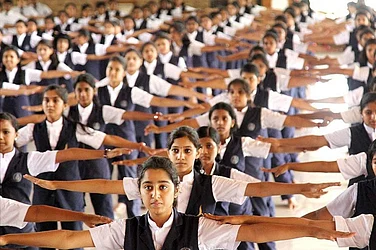As the end of Jammu and Kashmir’s special status has been mostly seen in terms of the region’s integration with the rest of India, most discussions on the subject have focused on its impact on the insurgency-hit, Muslim-majority Valley. It is rarely mentioned that Hindu-majority Jammu lost its special status too. A year after the abrogation of Article 370, many in Jammu feel they are destined to be a victim of the Centre’s approach to “either appease or punish” Kashmiris. “Jammu is like a doormat for Delhi-based leaders. On their way to Kashmir, they break the journey here, make promises and forget them the moment they leave for their destination,” says Pandit R.C. Sharma, a local peace activist, largely summing up the sentiment in Jammu.
Sharma, whose father arrived in Jammu from Pakistan-occupied Kashmir after Partition, runs an NGO, the JK Youth Sharnarthi Action Committee. Like many other locals, Sharma feels the Centre always ignored the people of Jammu to woo Kashmiris, and that now, after doing away with Article 370, it wants to change the demography of the Valley. He adds that Jammu stands to lose more of the benefits of autonomy than Kashmir, however limited they were.
“Most of those who will get domicile status of J&K under the new rules will settle in Jammu,” says PDP leader Firdous Tak. “The Dogra king Maharaja Hari Singh had made laws prohibiting outsiders from buying land or doing business in J&K as he knew the people here needed protection.”
Indeed, many locals are worried about being marginalised in the development process. “More people looking for cheaper land and business opportunities will migrate here as we are closer and easily accessible from the other states, while fear of violence will deter them from settling in Kashmir,” says Sharma. Pointing out that the people of Jammu had been meekly accepting discrimination against them in jobs within J&K, Bina Bakshi, who runs an NGO in Jammu city, says, “People of Jammu are simpler, less educated and politically less assertive for their rights than the people of Kashmir.”
The fear in Jammu is that “outsiders” may overwhelm the job market, leaving only low-paid jobs to the locals. “Anybody born and brought up in cities like Delhi and Chandigarh would have a better educational standard than the majority of students here,” says a district-level political leader who didn’t wish to be identified.
The BJP spokesperson for J&K, advocate Abhinav Sharma, who also heads the J&K High Court Bar Association, is quite confident that people will see the benefits of the abrogation of Article 370 once the initial hiccups of transition get over. “The previous pro-Kashmiri administration in J&K was responsible for many irregularities that deprived the people of Jammu of jobs. Now, as the Union territory is under the Union home ministry’s control, all institutions are under close watch. But, whenever there is a change in the entire system of governance, people are bound to face some difficulties initially. Just wait for a year or two and you will start noticing development on the ground due to the implementation of central laws. Power projects, broadening of roads and other infrastructural projects will ultimately benefit the people,” he says.
Not everyone in Jammu blames Kashmiris for the regional imbalance in development. “Jammu vs Kashmir is part of communal politics to incite people of a particular religion against the other,” says a Jammu-based educationist. “A Muslim-majority state joined India when the country was divided on communal lines because certain promises were made to them to protect their identity. Now, the Centre wants to change the demography and floats theories like Jammu vs Kashmir. Jammu and Kashmir are interdependent for many business activities. If normal life gets disrupted in Kashmir, Jammu is bound to face the consequences.”
Also Read:


























